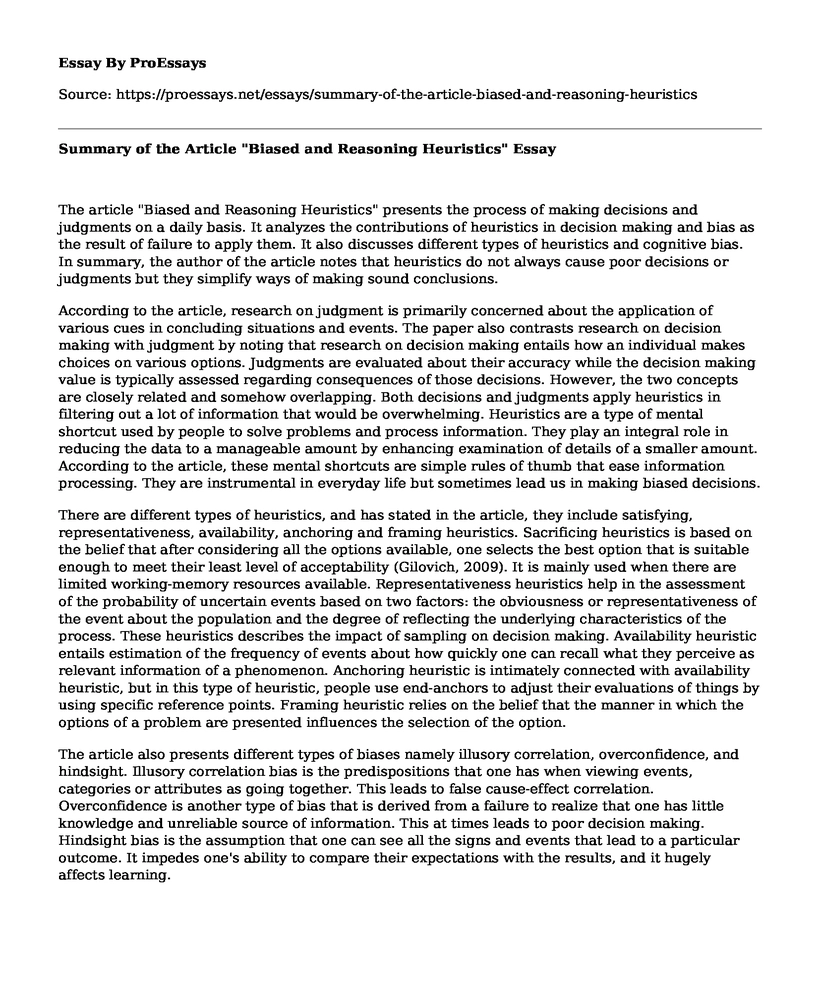The article "Biased and Reasoning Heuristics" presents the process of making decisions and judgments on a daily basis. It analyzes the contributions of heuristics in decision making and bias as the result of failure to apply them. It also discusses different types of heuristics and cognitive bias. In summary, the author of the article notes that heuristics do not always cause poor decisions or judgments but they simplify ways of making sound conclusions.
According to the article, research on judgment is primarily concerned about the application of various cues in concluding situations and events. The paper also contrasts research on decision making with judgment by noting that research on decision making entails how an individual makes choices on various options. Judgments are evaluated about their accuracy while the decision making value is typically assessed regarding consequences of those decisions. However, the two concepts are closely related and somehow overlapping. Both decisions and judgments apply heuristics in filtering out a lot of information that would be overwhelming. Heuristics are a type of mental shortcut used by people to solve problems and process information. They play an integral role in reducing the data to a manageable amount by enhancing examination of details of a smaller amount. According to the article, these mental shortcuts are simple rules of thumb that ease information processing. They are instrumental in everyday life but sometimes lead us in making biased decisions.
There are different types of heuristics, and has stated in the article, they include satisfying, representativeness, availability, anchoring and framing heuristics. Sacrificing heuristics is based on the belief that after considering all the options available, one selects the best option that is suitable enough to meet their least level of acceptability (Gilovich, 2009). It is mainly used when there are limited working-memory resources available. Representativeness heuristics help in the assessment of the probability of uncertain events based on two factors: the obviousness or representativeness of the event about the population and the degree of reflecting the underlying characteristics of the process. These heuristics describes the impact of sampling on decision making. Availability heuristic entails estimation of the frequency of events about how quickly one can recall what they perceive as relevant information of a phenomenon. Anchoring heuristic is intimately connected with availability heuristic, but in this type of heuristic, people use end-anchors to adjust their evaluations of things by using specific reference points. Framing heuristic relies on the belief that the manner in which the options of a problem are presented influences the selection of the option.
The article also presents different types of biases namely illusory correlation, overconfidence, and hindsight. Illusory correlation bias is the predispositions that one has when viewing events, categories or attributes as going together. This leads to false cause-effect correlation. Overconfidence is another type of bias that is derived from a failure to realize that one has little knowledge and unreliable source of information. This at times leads to poor decision making. Hindsight bias is the assumption that one can see all the signs and events that lead to a particular outcome. It impedes one's ability to compare their expectations with the results, and it hugely affects learning.Conclusion
In summary, heuristics do not result in poor decisions or wrong judgments but they simplify the process of concluding. As a manager, I would have to analyze the situation that requires the application of heuristics in making decisions or judgment and select the best heuristics that would yield the best conclusion. I would also advise my employees to be cautious in choosing heuristics when making decisions or judgment to avoiding making wrong conclusions.
References
Gilovich, T. (2009). Heuristics and biases: The psychology of intuitive judgment. Cambridge [u.a.: Cambridge Univ. Press.
Cite this page
Summary of the Article "Biased and Reasoning Heuristics". (2022, Mar 29). Retrieved from https://proessays.net/essays/summary-of-the-article-biased-and-reasoning-heuristics
If you are the original author of this essay and no longer wish to have it published on the ProEssays website, please click below to request its removal:
- My Three Characteristics Essay
- Book Analysis Essay on Crime, Punishment and Mental Illness
- Essay Sample on Mental Health: Types & Causes of Mental Illness
- Attitude Towards Mental Illness: Annotated Bibliography
- Adolescence: A Critical Analysis of Health and Impact - Research Paper
- Fear: A Human Experience of Terror, Distress, & Paralysis - Essay Sample
- Mental Illness and Homelessness - Free Report Example







